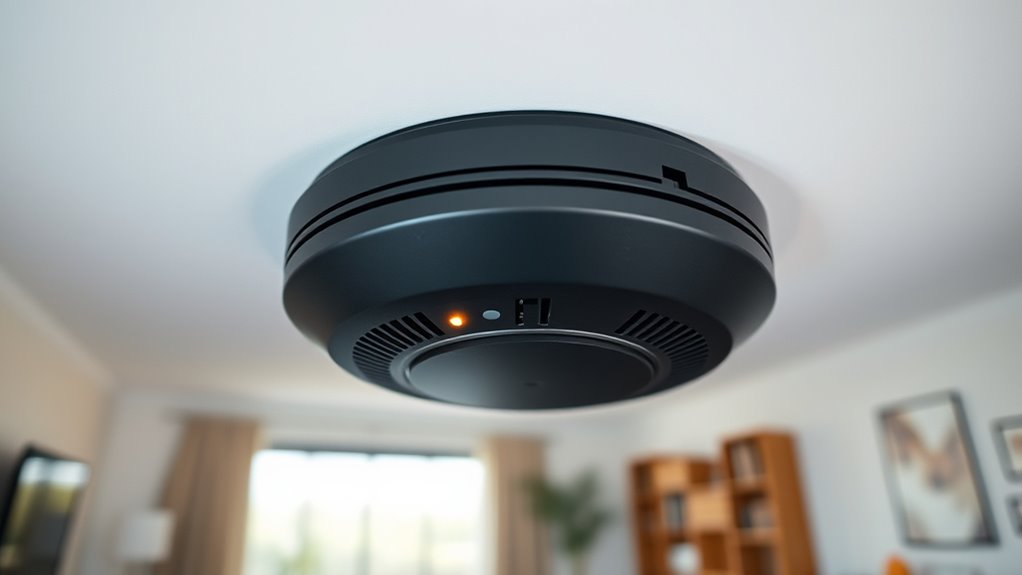Smart smoke detectors offer faster, more reliable fire detection and instant alerts to your smartphone, giving you peace of mind even when you’re away. They connect with other smart home devices to enhance safety and can often sense smoldering fires earlier. Though they come with higher costs and potential false alarms, their advanced features and remote monitoring can be well worth the investment. If you want to explore whether they’re right for you, there’s more to uncover below.
Key Takeaways
- Smart smoke detectors provide early fire detection, real-time alerts, and remote monitoring, significantly enhancing home safety and peace of mind.
- Their advanced sensors and interconnected alarms reduce false alarms and ensure faster emergency responses.
- Higher initial costs and ongoing maintenance may be a concern, but long-term safety benefits can justify the investment.
- Connectivity issues and environmental factors can impact reliability, requiring proper placement and regular maintenance.
- Upgrading offers integrated safety features like CO detection and automation, making it a valuable safety enhancement rather than a pointless expense.
The Advantages of Smart Smoke Detectors Over Traditional Models
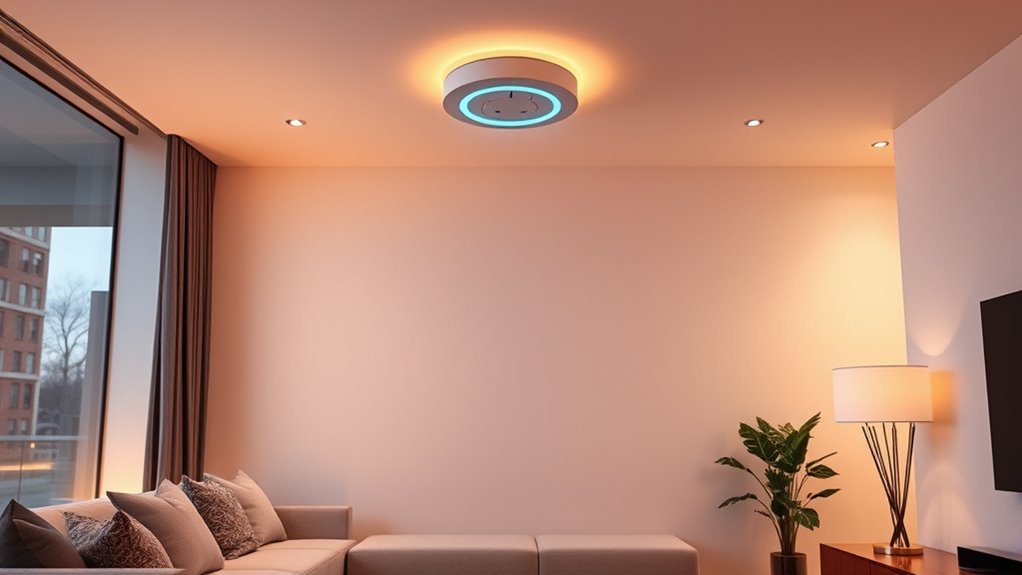
Smart smoke detectors offer significant advantages over traditional models by providing real-time alerts directly to your smartphone, no matter where you are. Unlike traditional smoke alarms, smart detectors use wireless connectivity to instantly notify you of potential fires or carbon monoxide issues, enhancing fire safety. They also connect with other interconnected alarms, so when one detects danger, all sound simultaneously. These devices continuously monitor their sensors and send maintenance reminders to prevent false alarms and sensor failure. Smart smoke detectors integrate seamlessly with your smart home system, enabling automated responses like unlocking doors or shutting off HVAC systems during emergencies. With advanced sensors for both smoke and carbon monoxide detection, they deliver faster, more reliable safety alerts, making them a smarter choice for comprehensive home protection. Additionally, ongoing research into AI vulnerabilities emphasizes the importance of reliable and secure safety devices to ensure trustworthy performance. As the integration of automation technology in homes continues to grow, smart detectors are becoming an essential part of modern safety systems. Moreover, proper attention to sensor calibration can further enhance their accuracy and effectiveness. Furthermore, the increasing adoption of wireless communication in security devices contributes to more efficient and responsive home safety networks. Recognizing the importance of data security is crucial as these devices transmit sensitive information, ensuring homeowners’ privacy and safety.
How Smart Smoke Alarms Enhance Fire Detection and Response
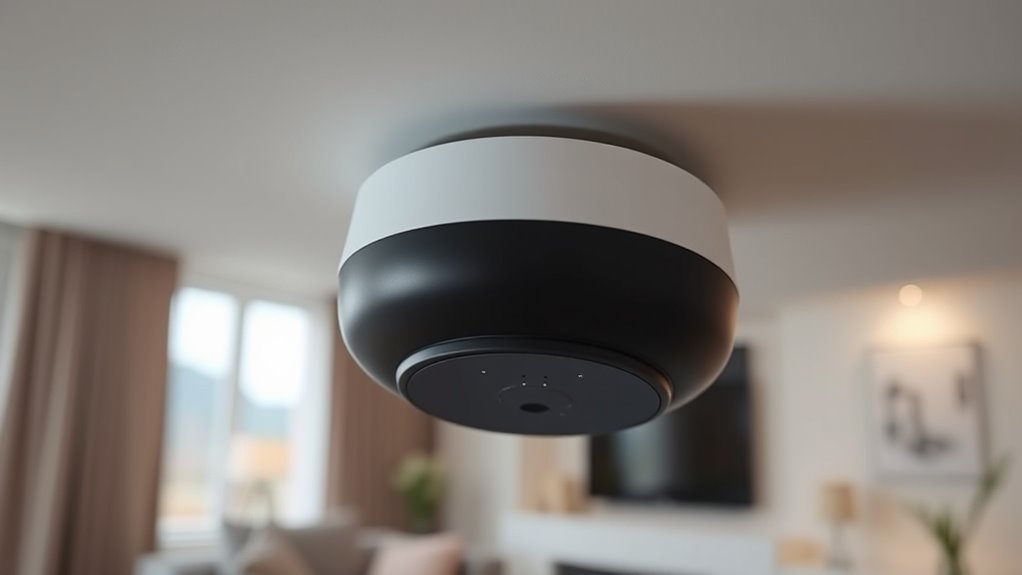
Smart smoke alarms detect fires faster thanks to advanced sensors that identify both smoldering and flaming flames. They send instant alerts to your phone, so you can respond quickly no matter where you are. Plus, their integration with other smart devices allows for coordinated safety measures, improving overall fire response.
Faster Detection Capabilities
Because they continuously monitor environmental changes, smart smoke alarms can detect smoke and heat more quickly than traditional models. They utilize advanced photoelectric sensors and dual smoke and heat sensors for faster detection of smoldering and flaming fires. These alarms sense rapid temperature rises, triggering an early alert before flames fully develop, which enhances fire safety. Sensor monitoring guarantees consistent performance, maintaining swift detection over time. When integrated with smart home systems, they send instant notifications to your smartphone, speeding up emergency responses. This sensor technology continuously improves to ensure more accurate and reliable fire detection, making smart alarms an essential safety feature. Additionally, the integration of wireless connectivity allows for remote monitoring and control, further increasing their effectiveness. Overall, their faster detection capabilities markedly improve fire safety, giving you peace of mind through early alerts and reliable performance.
Real-Time Alert Notifications
Have you ever wondered how smart smoke alarms guarantee you’re alerted instantly during a fire? With smart smoke alarms, you receive real-time alerts via push notifications directly to your smartphone, ensuring you’re aware of smoke or fire no matter where you are. These alarms use Wi-Fi or cellular connectivity to deliver instant alerts, often with voice notifications pinpointing the danger’s location. They also enhance home safety by automatically notifying emergency services through integrated monitoring, speeding up fire response. Additionally, smart detectors keep you informed of sensor malfunctions or low batteries via emergency notifications, preventing unnoticed issues. This rapid dissemination of information minimizes property damage and boosts safety, allowing you to react quickly. The integration of advanced technology in these devices truly elevates fire detection and response, making your home smarter and safer. Furthermore, many smart smoke alarms incorporate tuning features that optimize their sensitivity and reliability, ensuring consistent performance over time. Modern smart smoke alarms also often include compatibility with smart home systems, allowing seamless integration with other security devices for comprehensive protection. Regular updates and self-maintenance capabilities of these alarms help maintain optimal functionality and safety standards. For added peace of mind, some models feature battery backup systems that ensure operation during power outages, maintaining continuous protection.
Enhanced System Integration
Integrating smoke alarms with your home security system considerably enhances fire detection and response. Connected smoke alarms work seamlessly with other smart devices, enabling automated safety responses like shutting off HVAC systems to prevent fire spread. They deliver real-time notifications via mobile apps, so you stay informed even when you’re away. Many smart detectors feature voice alerts that specify the smoke or CO location, speeding up responses. This smart home integration creates a thorough safety network, where interconnected alarms trigger connected devices such as smart locks or lighting during emergencies. Features like self-testing ensure peak performance, reducing false alarms. Additionally, storage in a cool, dark place can prolong the lifespan of the detectors, ensuring they function properly when needed. Proper placement and regular maintenance of smart home devices can further improve overall safety and reliability. Conducting routine maintenance and keeping the units clean help prevent common issues like false alarms or malfunctions. Implementing system updates ensures that your detectors stay current with the latest security features and threat detection capabilities. Regularly reviewing alarm placement and ensuring proper spacing can enhance early fire detection. By combining smart device coordination with an enhanced safety system, you gain faster, more efficient fire detection and response, safeguarding your home and loved ones more effectively.
Factors to Consider Before Upgrading to a Smart Smoke Alarm
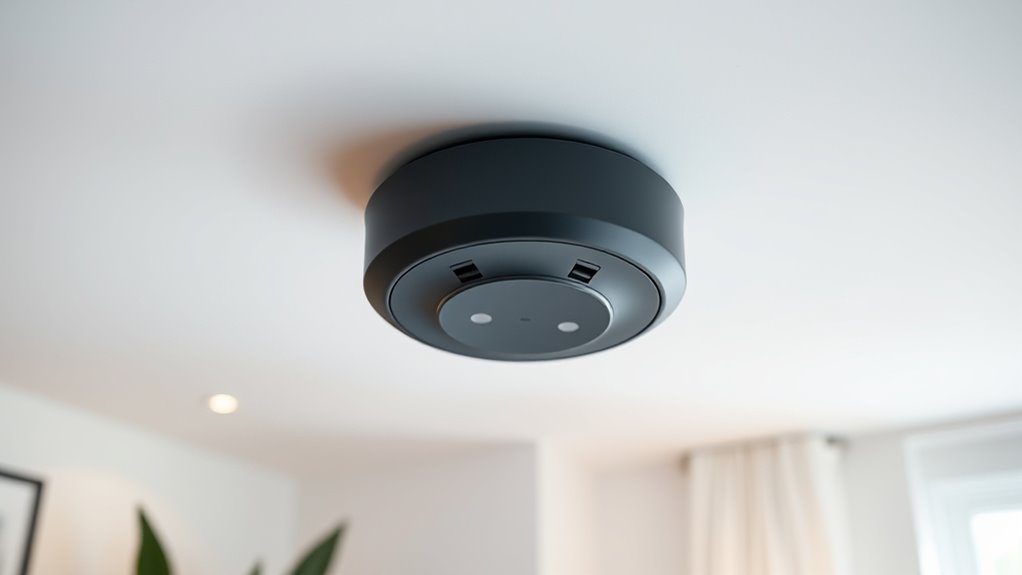
Before upgrading to a smart smoke alarm, it’s important to evaluate whether your current detectors still perform reliably and meet your safety needs. If your detectors are nearing 10 years old, their sensor effectiveness may have diminished, reducing early detection capabilities. Consider replacing units that frequently trigger false alarms or fail to respond during aerosol tests, as this indicates sensor malfunction. Check if your Wi-Fi is stable and compatible with smart home integration to ensure seamless operation. Additionally, assessing your device’s performance and lifespan can help determine if an upgrade is justified. Weigh the upgrade considerations, including higher upfront costs, against benefits like remote alerts, enhanced safety features, and continuous monitoring. Determine if features such as voice alerts and carbon monoxide detection align with your household’s safety priorities, making the upgrade worthwhile.
Common Limitations and Challenges of Smart Smoke Detection Systems
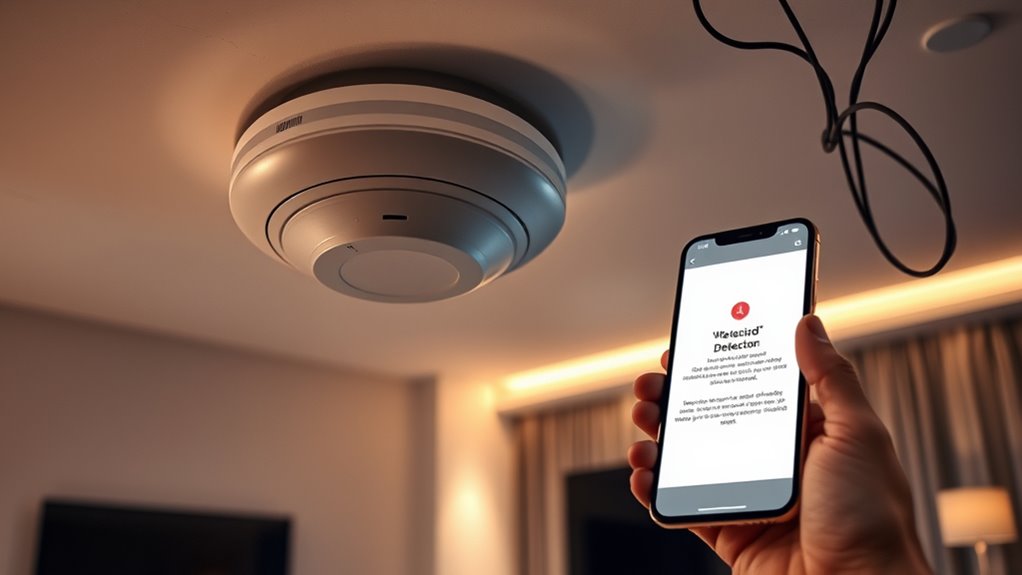
Smart smoke detectors can sometimes trigger false alarms, causing unnecessary stress and interruptions. Power and connectivity issues may leave you unprotected during outages or network disruptions, despite the device’s capabilities. Additionally, their higher cost and maintenance needs can make them less practical compared to traditional alarms, especially when compatibility or security concerns arise.
False Alarm Triggers
Have you ever experienced a false alarm from a smoke detector? If so, you know how frustrating false triggers can be, especially with smart alarms. These false alarms often result from sensor sensitivity issues caused by environmental factors like cooking fumes, steam, or dust. Placement issues near kitchens, bathrooms, or vents can increase false alarms due to air circulation and environmental influences. Some smart alarms include suppression features or adjustable sensitivity settings, but improper setup can still lead to unreliable alerts. False alarms diminish trust in your system, risking safety if ignored or disabled. To maintain reliability, proper placement and calibration are essential, ensuring your smart smoke detector provides accurate alerts without unnecessary disruptions.
Power and Connectivity Issues
Power and connectivity issues pose significant challenges for smart smoke detection systems, as their effectiveness depends heavily on a stable internet connection and reliable power sources. Wi-Fi outages can disable remote notifications and management features, leaving only local alarms active. Connectivity issues may cause false alarms or delayed alerts, reducing the system’s reliability when you need it most. Power failure can leave your detector useless unless it has a backup battery, but limited battery life may require frequent replacements. Compatibility problems with existing smart home devices can also hinder system integration. Because of this internet dependency, if your connection drops, smart features become ineffective. These limitations highlight that, despite their advanced features, smart smoke detectors still face hurdles that impact their overall dependability.
High Cost and Maintenance
High costs and ongoing maintenance present significant challenges for smart smoke detection systems. These devices typically range from $55 to $129, making them more expensive than traditional alarms. Regular software updates are essential for maintaining performance security, but they add to ongoing expenses. A stable Wi-Fi connection is vital; outages can compromise functionality. Replacement batteries or entire units are needed approximately every 10 years, increasing maintenance demands. Additional costs include professional installation, monitoring services, and integration accessories to enhance features. This can make the system costly over time. Consider the following:
- Cost of initial purchase and professional setup
- Maintenance for software updates and battery replacements
- Dependence on Wi-Fi stability for ideal performance
- Expenses for monitoring services and accessories
These factors can make smart smoke detectors a significant investment.
Comparing Costs and Long-Term Savings of Smart Versus Conventional Detectors
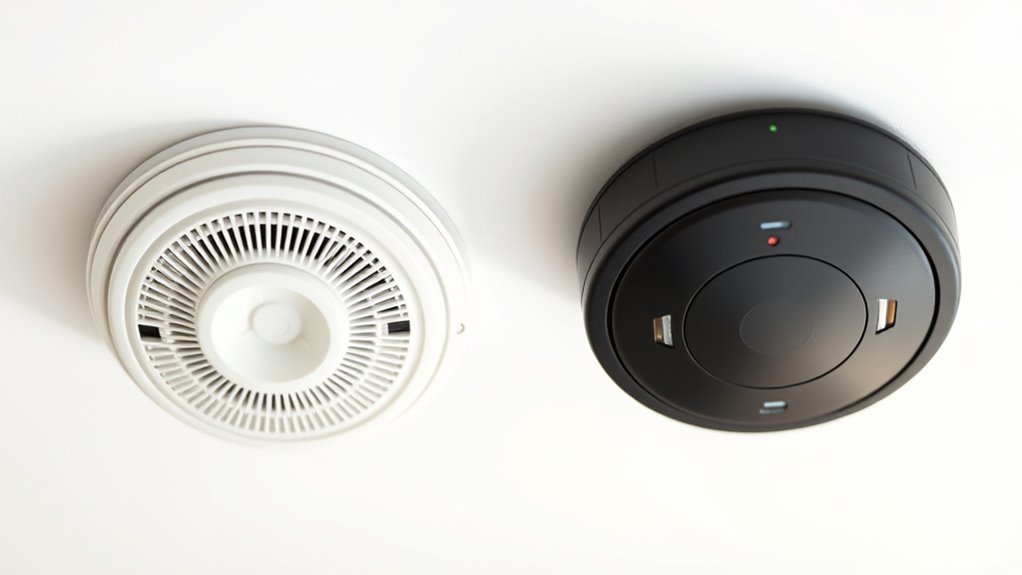
While smart smoke detectors often come with a higher initial price tag—ranging from $100 to $150 compared to $20 to $50 for conventional 10-year alarms—they can offer significant long-term savings. Over a decade, smart detectors reduce false alarms and avoid early replacements, lowering maintenance costs. Their integration with smart home systems can also automate safety responses, preventing costly fire damage. Additionally, their remote alerts and monitoring may lower home insurance premiums. Here’s a comparison:
| Feature | Conventional Smoke Alarms | Smart Smoke Detectors |
|---|---|---|
| Initial Cost | $20–$50 | $100–$150 |
| Maintenance | Manual checks, early replacement | Automated, fewer replacements |
| False Alarms | Common, costly | Reduced through intelligent detection |
| Fire Safety & Security | Basic alerts | Automated responses, integration |
| Long-Term Savings | Limited | Potentially higher due to features |
Smart detectors, despite higher upfront costs, can be more cost-effective in the long run.
The Importance of Proper Placement and Maintenance for Smart Alarms

Proper placement and regular maintenance are essential for guaranteeing your smart smoke alarms function effectively. Correct placement, like on ceilings or high on walls within 10 feet of cooking areas, helps detect smoke early and reduces false alarms. Follow placement guidelines to avoid vents, windows, or fans that can cause drafts and impair detection. Routine maintenance, including testing monthly and cleaning sensors, keeps your smoke detectors reliable. Replacing units every 10 years preserves their effectiveness and safety. Proper installation, whether through hardwiring or strong Wi-Fi signals, ensures seamless smart alarm features. Neglecting maintenance or poor placement can compromise detection, leading to false alarms or missed smoke. Prioritize cleaning, testing, and correct positioning to maximize your smart alarms’ safety benefits and reliability.
Integrating Smart Smoke Detectors Into Your Existing Home Security System
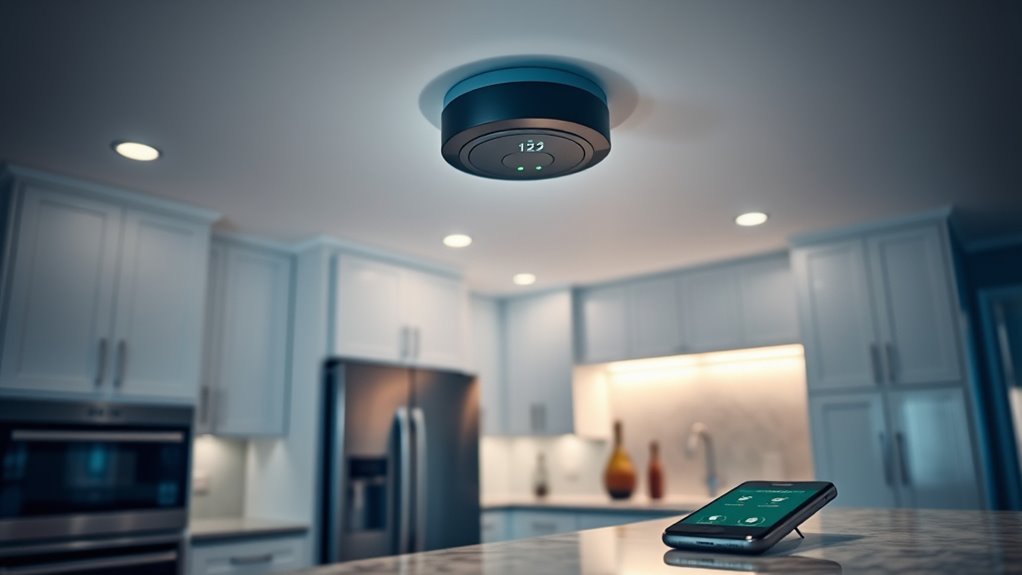
Integrating smart smoke detectors into your existing home security system can substantially enhance your safety by enabling seamless communication between devices. Many smart detectors support integration through protocols like Z-Wave, Zigbee, or Wi-Fi, making them compatible with various smart home security platforms. Brands such as Nest Protect and Onelink offer options that work with popular hubs like Google Home and Apple HomeKit. Proper integration often requires additional hubs or bridges to connect smart detectors to traditional alarm systems, ensuring smooth communication. This setup allows for automation, such as turning off HVAC systems or release doors during emergencies. It also improves remote monitoring, so you receive alerts and manage alarms through a unified security app or control panel, boosting your home’s overall safety and automation.
Real-Life Scenarios Demonstrating the Effectiveness of Smart Smoke Alarms
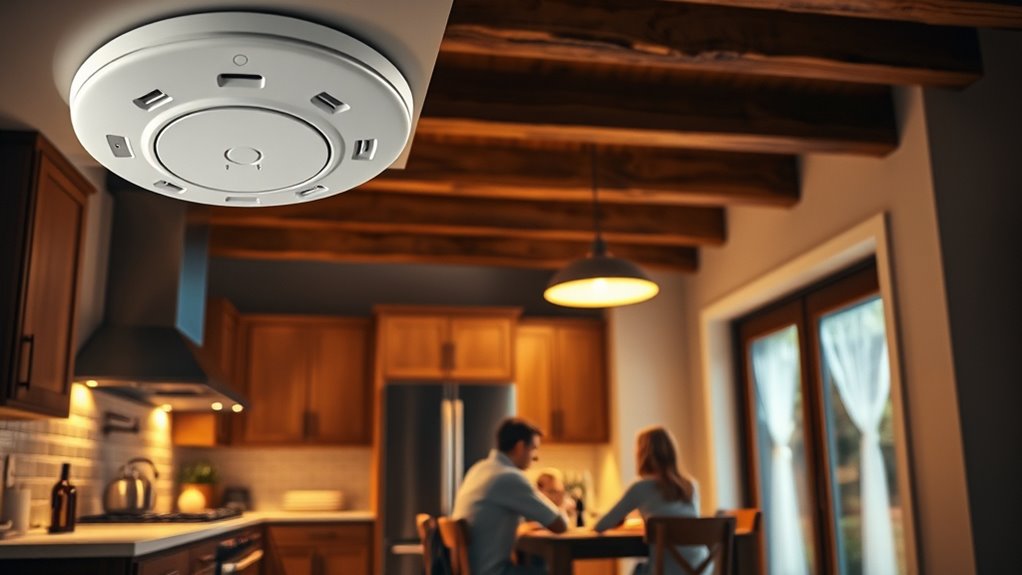
Smart smoke alarms have proven their worth in real-life situations by providing rapid alerts that can prevent disaster. These smart home safety devices quickly notify you through instant notifications on your smartphone, allowing prompt responses even when you’re away. For example, a smart detector identified slow-smoldering smoke from an electrical issue overnight, preventing property damage and injury. During a false alarm caused by cooking, its silence feature avoided unnecessary panic, showcasing practical fire detection. Interconnected alarms ensure that if one detects smoke, all alarms trigger simultaneously, alerting everyone regardless of their location. Studies show homes with smart smoke alarms experience faster emergency alerts, reducing fire-related injuries and fatalities. These smart technology-powered devices are essential tools for enhancing fire prevention and overall home safety.
Making the Decision: Are Smart Smoke Detectors a Worthwhile Investment?
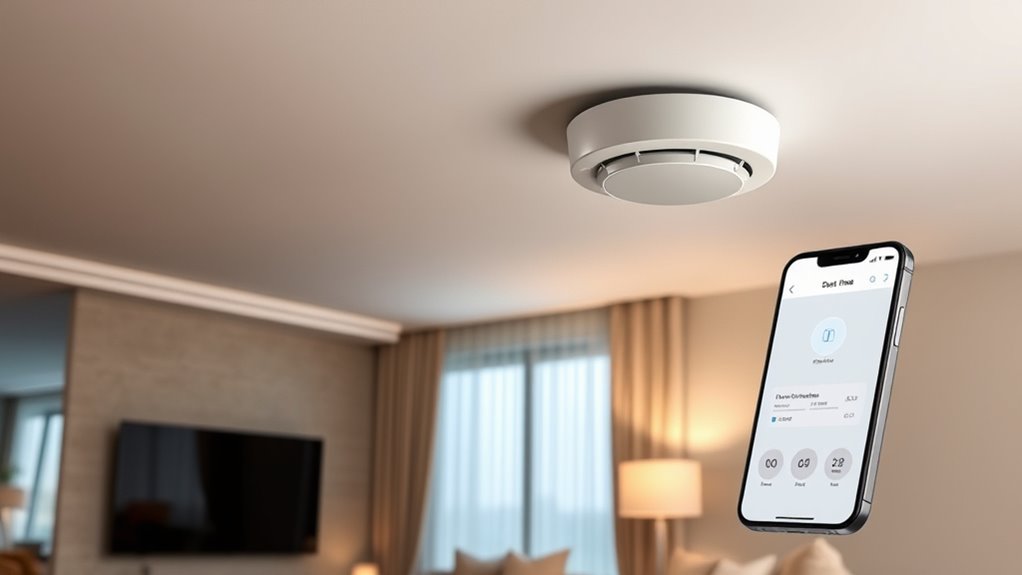
Considering the proven effectiveness of smart smoke detectors in alerting you quickly and even remotely managing your home’s safety, it’s natural to weigh whether investing in these devices makes sense for your household. Smart smoke detectors excel in fire detection, providing real-time alerts via your smartphone, which can substantially cut response times during emergencies. Their remote monitoring and integration with home automation enhance overall safety, allowing automatic actions like shutting off HVAC or opening doors. However, their reliance on Wi-Fi and potential false alarms from improper placement might be drawbacks. Despite higher upfront costs, the long-term peace of mind they offer through continuous monitoring and faster emergency response could make them a worthwhile investment for your home safety needs.
Frequently Asked Questions
What Smoke Detector Do Firemen Recommend?
Firefighters recommend smoke detectors with dual sensors—ionization and photoelectric—for thorough fire detection. They advise installing interconnected alarms in bedrooms, hallways, and kitchens to guarantee rapid alerts. Make certain to replace your detectors every 10 years and choose models with loud, clear alerts and easy testing features. Many also suggest smart detectors that connect to your home security system, offering faster notifications and peace of mind during emergencies.
What Is the Most Reliable Smart Smoke Detector?
You’re asking about the most reliable smart smoke detector, and it’s like choosing the superhero of safety devices. The Google Nest Protect stands out with its dual-sensor tech, voice alerts, and self-tests, making it a top choice. Its advanced features guarantee you’re alerted quickly and accurately. Investing in this smart detector means you’re getting a dependable, high-tech guardian for your home, offering peace of mind that’s worth every penny.
What Is the Best Technology for Smoke Detectors?
When selecting the optimal smoke detector technology, you should consider dual sensors that combine photoelectric and ionization detection. This setup guarantees quick response to both smoldering and flaming fires. Smart detectors with Wi-Fi or Bluetooth add remote alerts and integration with other devices. You benefit from early warnings and extensive safety, making dual-sensor models your best bet for reliable, versatile fire detection that adapts to different fire types and offers peace of mind.
Are Interlinked Smoke Alarms Worth It?
Think of interlinked smoke alarms as a well-coordinated team, working together to catch danger early. You’ll find they’re worth it because they activate simultaneously, cutting response times by up to 30%. This means you get faster alerts, especially in large or high-risk areas like bedrooms and kitchens. Though they cost more upfront, the peace of mind they provide—knowing your whole home is protected—makes them a smart investment.
Conclusion
So, are smart smoke detectors a game-changer or just a fancy gadget? If you enjoy waking up to your phone buzzing with “fire alert” notifications instead of a traditional alarm, they’re perfect. Otherwise, you might just be paying extra for features you don’t need. Either way, whether they save lives or just look cool on your ceiling, one thing’s for sure: your house is now smarter than you. Just don’t forget the fire extinguisher!
